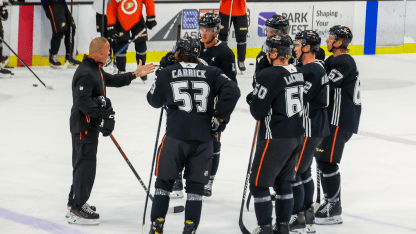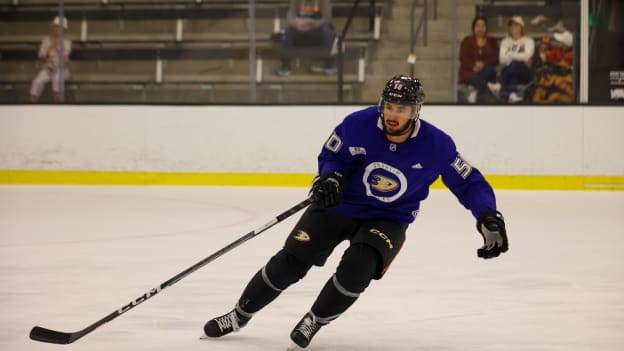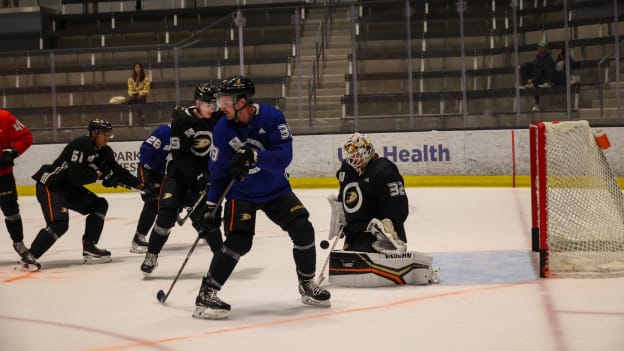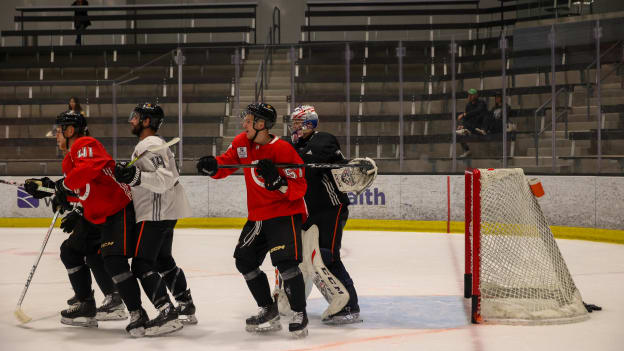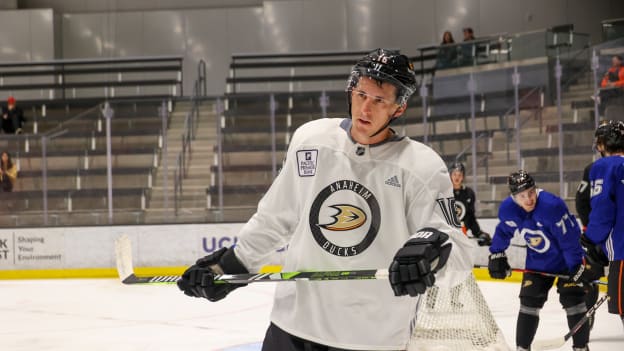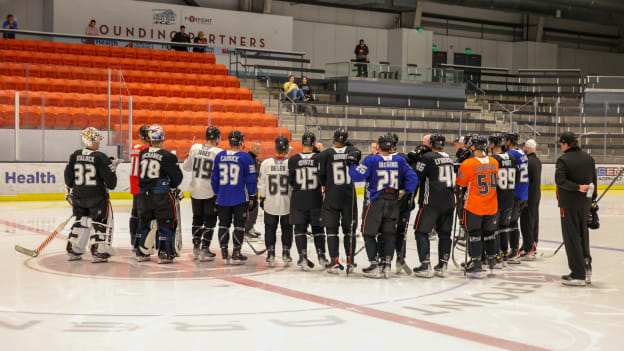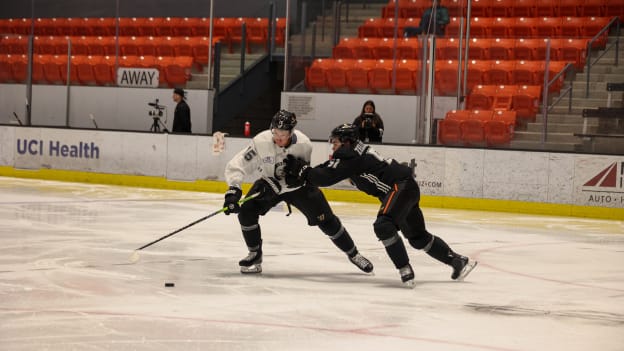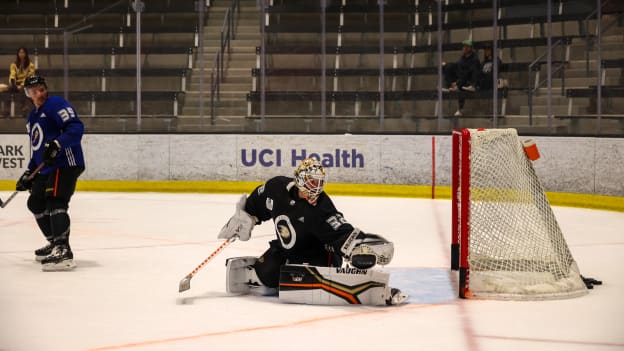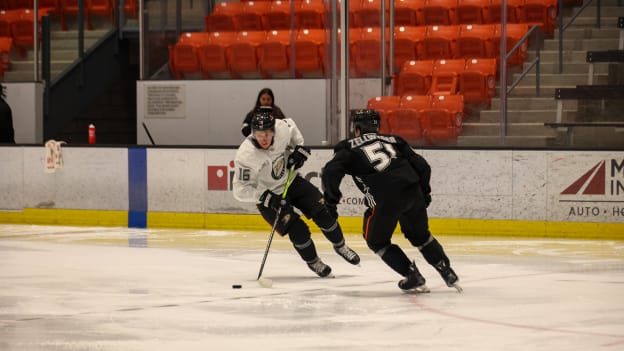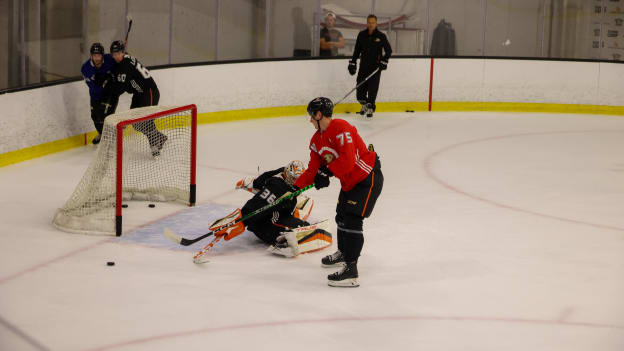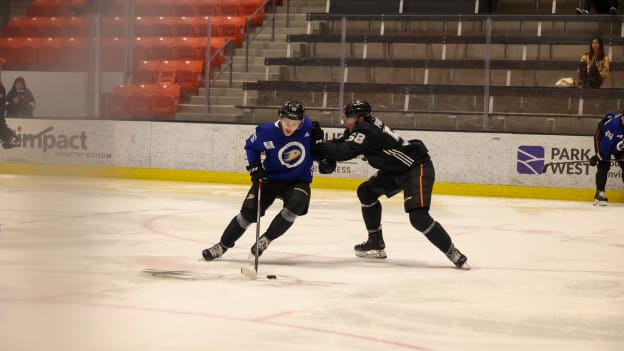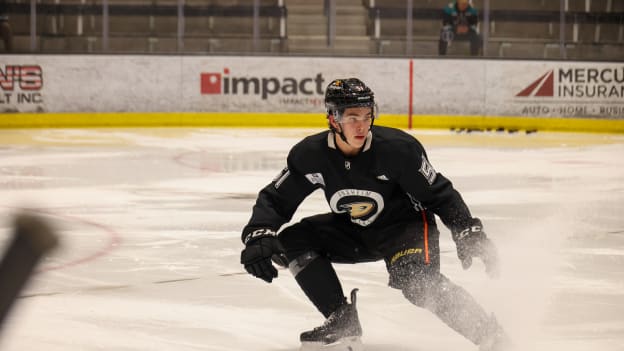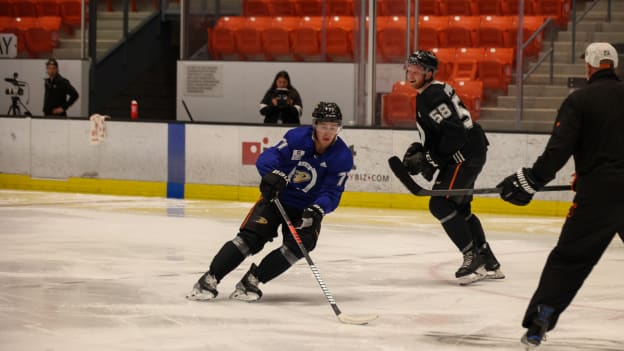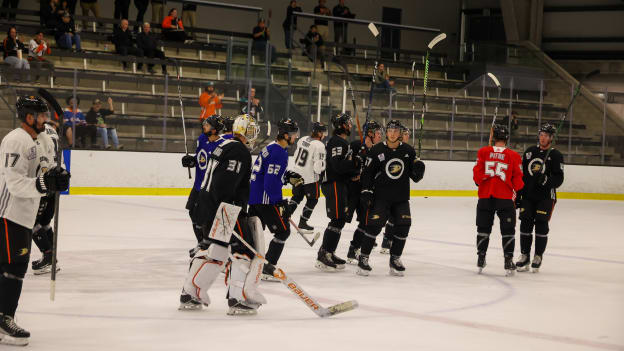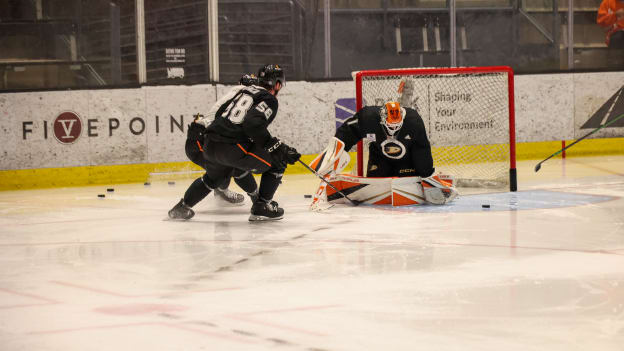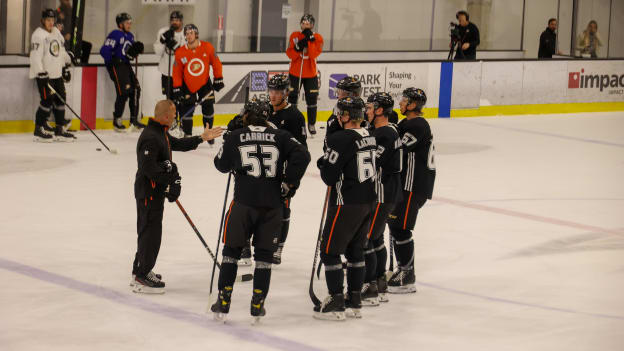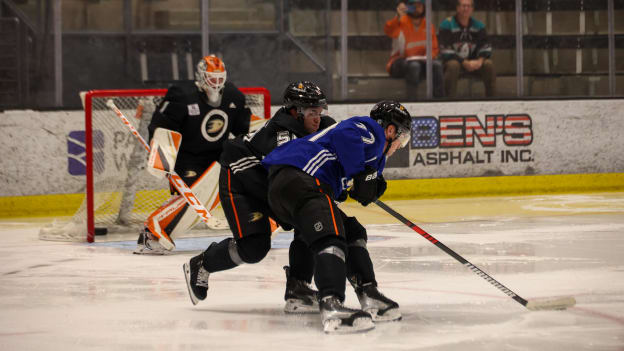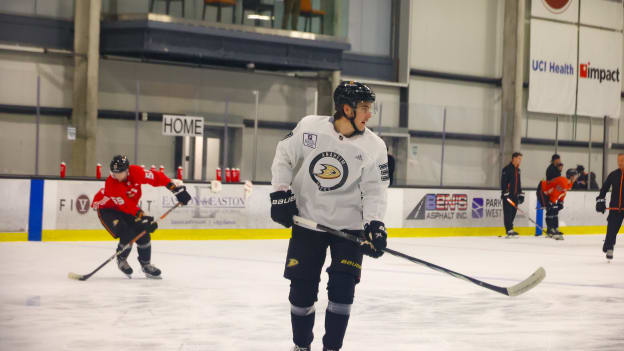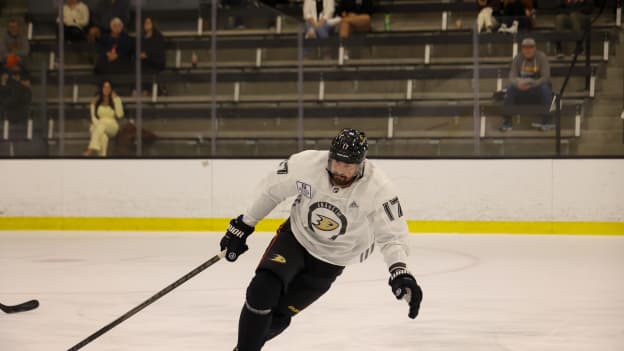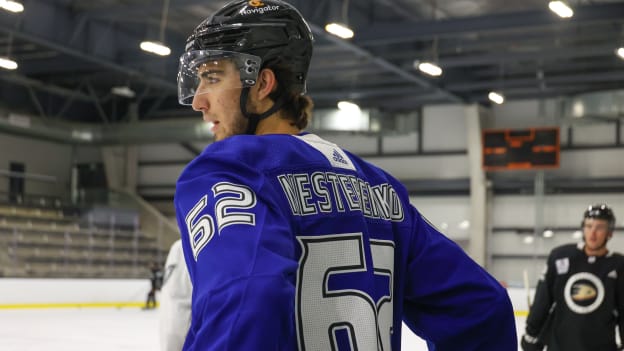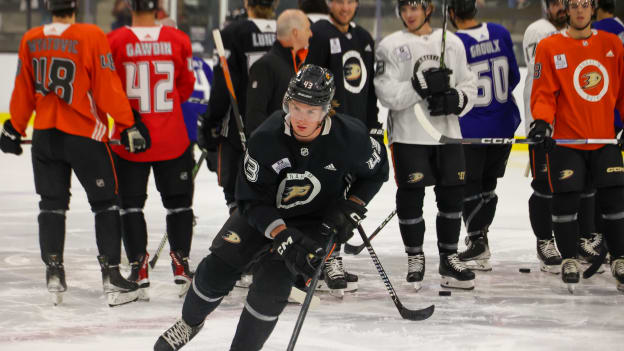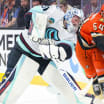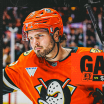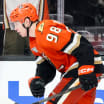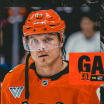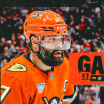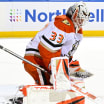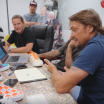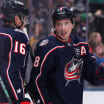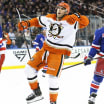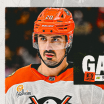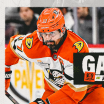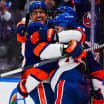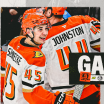Head Coach Greg Cronin
On his initial impressions of the organization
Well, I've never heard anything but positive things about the Samuelis and their commitment to the team and to the community. That's been reflected everywhere I've been, whether it's to the draft or dinners and things like that.
Obviously Paul [Kariya] is a big part of the organization. His jersey's up in the rafters and I've known him a long time. He's a big promoter of the Ducks.
I think they all genuinely want us to do well individually. I watched tape when I was going through the interview process, so I was able to get a sense of the guys that are coming back now and who does what. I thought today on the ice was interesting, trying to take the image I had, watching the games on TV in the regular season and then seeing things that I saw in that environment and trying to put a game plan together for the individuals that'll, I think, have an impact on the way we play as a group. That's going to be a process. It's our first introduction to it, so we're kind of getting a sense of where we're starting from.
On Leo Carlsson
I think when he was here at development camp, he was a little fatigued. It was kind of a long journey for him going from the Swedish League to the World Championships to the combine. Then he comes here and I think psychologically and probably physically, he was a little fatigued. Then I thought he had some pop to him in the rookie tournament. I heard he was a little bit sick, but I thought he played well there and I noticed him.
When you're coaching on the ice, as a head coach, you try to make sure that drills go properly and you're also trying to coach individually. When you're on one half of the ice and he may be on the other side of the ice, but I did notice him multiple times make big time plays, and that's one of the things that we've had conversations about.
Some young guys come in and they kind of get nervous and they get fearful in an environment with these NHL players. It kind of stalls their impact in practice...I had Matt Barzal in New York and he felt like he belonged as an 18-year-old. He was actually a year younger than Leo, and he's a totally different player, but he got better with the better players. I think, just in a small snapshot, I thought Leo looked better today than I've seen them in the other views I've had.
On the impact of Radko Gudas and Alex Killorn
Well, it's amazing. They're good people. So number one, they're good people and they came here because they want to participate in a rebuild. When you take on that responsibility, it really speaks about your maturity and that you're investing in the organization, not just trying to worry about yourself. We talked about that before they came. There's a different dynamic going from here or from Tampa Bay to here or Florida to here where they've been cup finalists or whatever...So the space they're going to occupy here is much broader and I think that speaks volumes about them as people and their character. You can see on the ice just the little things they do and they're humble guys.
I've been around a long time. Some of the stuff I teach is different, and I just think in my years of coaching, these are foundational pieces that if guys can get comfortable doing them, we can get really better quickly as a team. They went through some drills today that I know they were like kind of, 'what is this?' But by doing things and being uncomfortable, you find out ways to improve. Even if you're 34 years old like Gudas and Killorn, they're the first ones that come up to you and say, 'Crow, I've never done this. I didn't realize these things are weapons you can use in defending.'
Then we're going to share those with the guys and have them go over [it], feel that and then be able to talk to one of their teammates about it. I think it's just the start of that process of the mentorship they're going to build here.
On instilling a sense of discomfort within the team
Well, there are certain levels of discomfort. One of which is, I don't know their conditioning level. I don't know what they did in the summer. I kind of know from the test results we got, but when you go out and you practice and you've got resistance in the practice, it's not like summer hockey where there's 50% resistance. So there's a level of discomfort there that they deal with that's natural for everybody.
But I think the discomfort they might deal with that we're teaching in terms of those foundational pieces is what I'm really drawn into because they'll eventually acclimate and they'll get to game condition. When you drill into those areas where we can be instantly better in how we defend and then how we respond to that away from that battle, that's what we're trying to get into. Troy had some moments on the ice where I said, 'you understand why you get beat there?' And he didn't. So then we go to the second half and we're doing more controlled teaching, the light goes on. He said, 'now I get it.'
That's why I just say, as a staff, we've just got to constantly keep preaching a consistent value system on how we're going to defend and how we're going to attack.
On Killorn and Gudas helping the coaching staff
Honestly, they got to be a combination of player and coach. They've got to help us coach. They do. I mean, Alex Killorn has won two Stanley Cups and been in three finals in five years. If you don't listen to him, then you got to screw loose, right?
So, obviously, we're trying to bring these guys in and we're trying to feed them the ideology and the standards that we're creating, the goals we're creating and the process, how we're going to do it. And they're good people. I mean, I've been around a long time. I watched Tampa from the Islanders bench, the Toronto bench. I saw [John] Cooper's teams play in the American League and the USHL, and he does things that obviously win championships. So if Alex wants to share something with me that's going to strengthen what we're doing, I'm going to listen.
I tell the guys when they're playing hockey, we're just trying to give them, when you arrive at battles, there's certain weapons where you're going to use to try and get the puck back. We try to give them a small menu of weapons to use. You can't overload players. I just try, when we talk to the players, we say, 'Hey, have you thought about this?'

